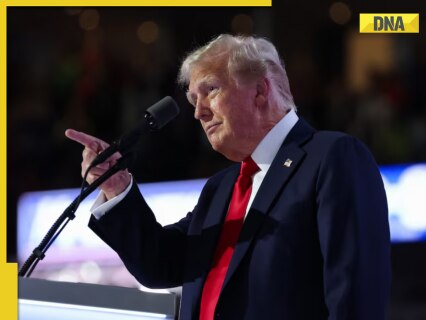
Trump’s sudden decision to make new demands sent Congress spiralling as lawmakers are trying to wrap up work and head home for the holidays
President-elect Donald Trump abruptly rejected a bipartisan plan on Wednesday to prevent a Christmas time government shutdown, instead telling House Speaker Mike Johnson and Republicans to essentially renegotiate — days before a deadline when federal funding runs out.
Trump’s sudden decision to make new demands sent Congress spiralling as lawmakers are trying to wrap up work and head home for the holidays. It leaves House Speaker Mike Johnson scrambling to salvage a new plan, days before Friday’s deadline to keep government open.
“Republicans must GET SMART and TOUGH,” Trump and Vice President-elect JD Vance said in a statement.
The president-elect made an almost unrealistic proposal for a continuation of government funds along with a much more controversial provision to raise the nation’s debt limit — something his own party routinely rejects.
Democrats decried the GOP revolt over the stopgap measure to keep federal offices running.
“House Republicans have been ordered to shut down the government,” said House Democratic Leader Hakeem Jeffries. “And hurt the working class Americans they claim to support. You break the bipartisan agreement, you own the consequences that follow.”
Already, the bill was on the verge of collapse, as hard right conservatives and Trump’s billionaire ally Elon Musk rejected the plan.
Rank-and-file lawmakers decried the massive 1,500-page bill over its increased spending — which includes their first pay-raises in more than a decade — a shock after one of the most unproductive chaotic session in modern times. A number of Republicans were waiting for Trump to signal whether they should vote yes or no.
“This should not pass,” Musk posted on his social media site X in the wee hours of Wednesday.
The outcome comes as no surprise for Johnson, who like other Republican House speakers before him, has been unable to convince his majority to go along with the routine needs of federal government operations, which they would prefer to slash.
Even the addition of much-needed disaster aid, some USD 100.4 billion in the aftermath of hurricanes Helene and Milton and other natural calamities that ravaged states this year, plus USD 10 billion in economic assistance for farmers failed to win over the budget-slashing GOP.
It all shows just how hard it will be for Republicans next year, as they seize control of the House, Senate and White House, to unify and lead the nation. And it underscores how much Johnson and the GOP leaders must depend on Trump’s blessing to see any legislative package over the finish line.
“What does President Trump want Republicans to do: vote for the CR or shut down government? Absent direction, confusion reigns,” said retiring Senator Mitt Romney, R-Utah, in a sly post on X.
The president-elect had yet to weigh in on what the lawmakers should do.
But Musk, who is heading the new Department of Government Efficiency that was leading the charge against it, warned that “Any member of the House or Senate who votes for this outrageous spending bill deserves to be voted out in 2 years!”
It is not an idle threat coming from Musk, the world’s richest man, who helped bankroll Trump’s victory and can easily use his America PAC to make or break political careers.
Democratic Rep. Jamie Raskin of Maryland said this is the problem with “an oligarchy, a handful of wealthy people run everything and everyone is supposed to live in fear of them; and their wealth becomes an instrument of coercive power over everything”.
Democrats, who negotiated the final product with Johnson and Senate GOP leadership, will be expected to provide enough support to help Johnson ensure passage, as is often the case on big bills. Federal government funding runs out at midnight Friday.
“The sooner Congress acts, the better,” Senate Majority Leader Chuck Schumer said as he opened the upper chamber. “As always, bipartisan cooperation must lead the way — we cannot have last minute delays or grandstanding.”
The final package extends existing government programmes and services at their current operating levels for a few more months, through March 14, 2025.
The stopgap measure is needed because Congress has failed to pass its annual appropriations bills to fund all the various agencies in the federal government, from the Pentagon and national security apparatus, to the health, welfare, transportation and other routine domestic services. When the fiscal year ended on September 30, Congress simply punted the problem by passing a temporary funding bill that expires on Friday.
But the inches-thick bill goes beyond routine funding and tacks on several other measures that lawmakers are trying to push through to passage before the end of this congressional session, especially as some elected officials will not be returning in the new year.
Rep. Anna Paulina Luna, R-Fla., called it essentially a junk sandwich, using a swear word. The chairman of the Freedom Caucus, Rep. Andy Harris, R-Md., said a lot of lawmakers “are a little disappointed at how this last week has worked out”.
And then there is the pay-raise.
Some lawmakers expressed concern that the bill turns off a pay freeze provision that was included in the previous short-term spending measure. That change could allow a maximum pay adjustment of 3.8 per cent or USD 6,600 in 2025, bringing their annual pay to USD 180,600, according to a Congressional Research Service report.
(Except for the headline, this story has not been edited by DNA staff and is published from AP/PTI)
